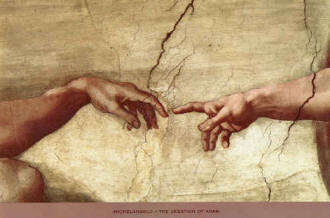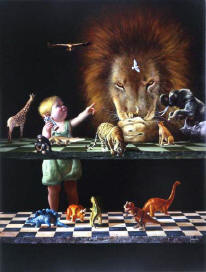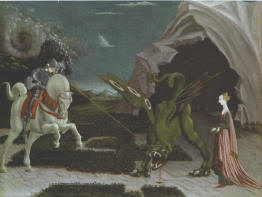(Back
to
Honors Seminar Home Page)
The Western
Religious Experience:
The Bible as
Literary Text, Cultural Force, and Spiritual Guide

For
believers and nonbelievers alike, the Bible stands as an undeniable
force that profoundly shapes Western cultural identity. Even as
religions differ in their assessment of what the divine text means and
the degree to which God insinuates His love into our daily lives, the
Bible informs our identity in a number of ways.
For
the New Testament Christian, the Scriptures are a living document of
God's presence in the world, providing instructional guidance for this
life and promises for the next, while for the Jew it remains a testament
of a people, demanding and at times inexplicable, as an account of the
hopes, suffering, and patience of generations awaiting divine promise.
Even those
who deny God's existence, or the sacred authority of the books that
constitute the spiritual plan and will of a creator, find the Bible rich
in its stories of human experience and archetypal structures. A
historian of ancient cultures and an acknowledged atheist, Lane Fox once
remarked that he believes in the Bible but not in God; the "truth" that
Fox finds in the Bible is not that of the believer, but a coherence
which has its own reality in the questions, experiences, and longings of
humanity.
Debates may
rage over the divinity of its books, or the literal and metaphorical
significances of the accounts and injunctions found in the Bible, but
the various records that constitute that work collectively comprise the
single most influential force upon Western thought, transcending
cultural differences and uniting peoples in a common heritage of how
humanity measures and questions its own existence.
The
Bible has a dual nature in Western society as a text that both directs
our lives and provides a source rich in human expression. In the Honors
seminar "The Western Religious Experience: The Bible as Literary Text,
Cultural Force, and Spiritual Guide," we will examine the Bible and its
impact on Western experience in its many social and philosophic forms.
On the one
hand we will study the Bible as divine inspiration, as we examine the
text as documentation of God's purpose for creation and plan for
salvation. On the other, we will separate the Bible from its
divinity, studying the testament texts as literary, mythological,
social, and historical influences upon our culture.
Our several
focuses in this class will directly contradict one another, reflecting
the interdisciplinary nature of the class and its many disparate points
 of
view; yet we will endeavor to maintain an objectivity with regard to the
single most significant force on the cultural and psychic development of
Western civilization in general and the Judeo-Christian ethos in
particular.
of
view; yet we will endeavor to maintain an objectivity with regard to the
single most significant force on the cultural and psychic development of
Western civilization in general and the Judeo-Christian ethos in
particular.
The
course will begin with the Bible as spiritual document, as we look at
the accounts of creation, the "J" and "P" writers, and the Book of
Genesis. Later in the course we will turn to the New Testament and
compare the accounts of Christ's birth, ministry, and death in the four
gospels, focusing in particular on the non-synoptic Gospel of St. John.
Contrasting
to the holiness of the text, however, we will also regard the Testaments
as literary works, as fictive expressions that compare to other
mythologies. The inherent sectarianism we bring to literary exegesis
will point up the ennobling characteristics of the Bible as discursive
stories that are undeniably powerful in their archetypal, allegorical,
and thematic implications. Toward that end, we will also read a number
of literary and philosophic works that demonstrate scriptural influence,
rich in their diverse personal expression, from an English mystery play,
to the abuses of religion for personal gain, to Sigmund Freud's
fascination, some would say obsession, with our need for monotheism.
American literature -- and perhaps a
controversial movie or two -- will significantly figure in this part of
the term, since in our nation's beginnings America was regarded as the
"New Israel," a view that is even today championed by
religious-political coalitions. Along the way, I hope to invite
several speakers to the class to engage in a question-answer session
with students, ranging from atheism to religious beliefs that
unfortunately remain disregarded or unknown to many of us.
Given
the immensity and complexity of the subject matter, this course must be
necessarily discursive in its approach; thus the reading is considerably
far-ranging. Members of the seminar will have two examinations, write a
term paper, and be required to keep a journal on the ways that religion
influences their daily activities, from the public Sabbath to the
private experience.
There
are no prerequisites for the class; however, students are asked to
remember that, in studying the Judeo-Christian tradition -- spiritual
and profane -- from the standpoint of divine inspiration to that of
mythology, we will treat the subject objectively and dispassionately.
You are asked to bring an open mind to the class and its discussions.
Our purpose is to see the Bible as the single most important influence
on our culture, discussing the many and varied forms that religion takes
in our society, within our consciences, and as part of our identity as a
people.
HNRS
4213-5213: The Bible and Western Culture
Tentative
Course Outline:
Week One:
Hebraism and Hellenism; Readings: Auerbach's "Odysseus? Scar"; The Book
of Genesis: Creation. The "J" and "P" writers. Jacob and Esau
Week Two: The creation myths. The "mythos" and its
Universal Expression. Reading: Gilgamesh
Week Three: Universality; Religion and the tragic
spirit: the Book of Job
Week Four: The Gospels; Christ as epic figure; as tragic
character; the non-synoptic Gospel of John
Week Five: Reading: Wilton Bernheardt's Gospel
Week Six:
The Age of Faith. Reading: The Canticle of Liebowitz; Ariés
The Hour of Our Death (selections), Film: "The Name of the Rose"
Weeks Seven and Eight: The Modern World: Nietzche's
Genealogy of Morals (selections); Freudian Psychology: "Moses and
Monotheism"; "Totem and Taboo" (selections); Jung and mysticism: Two
Essays on Analytical Psychology (selections)
Week Nine: The threat from evolution; Darwin; Scopes
"Monkey Trial"; "Creation Science"; Philosophic questioning; Humanism
and morality
Week Ten: Reading and Film: Inherit the Wind
Weeks Eleven and Twelve: The Devil in the Details:
Readings: Elain Pagels The Origins of Satan (selections);
Hawthorne's "Young Goodman Brown"; Levin's Rosemary's Baby
Week Thirteen: American social contract: from Mormons to
Jews; Gold's Jew's Without Money
Week Fourteen: America: after the fall of the "New
Israel"
Required
Texts: (all available at the campus
bookstore)
The Bible (King James Version,
preferred)

The Epic of Gilgamesh,
ed and trans. by Herbert Mason
Moses and Monotheism,
Sigmund Freud
Psychology and Religion,
C. G. Jung
The Evil and the Guilty
(no editor: Great Books Foundation)
Gospel: A Novel,
Wilton Barnheardt
Jews Without Money,
Michael Gold
"Young Goodman Brown," and
Other Stories, Hawthorne
Canticle For Leibowitz,
Walter Miller
Inherit the Wind,
Jerome Lawrence and Robert. E. Lee
Optional
Texts:
(available at the campus bookstore)
How to Know God,
Deepak Chopra
Introduction to
Christianity, Brakke and Bivins (3rd
ed.)
On
Reserve at Ellis Library:
The Origin of Satan,
Elaine Pagel
The Hour of Our Death,
Phillipe Ariés
Totem and Taboo,
Sigmund Freud
The Origin of Species,
Charles Darwin
The Power of Myth,
Joseph Campbell
Genesis, Ed. E. A. Speiser (The Anchor Bible)
The Torah (American Jewish Society)
Honors
Seminar Home Page